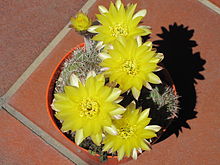Echinopsis aurea
| Echinopsis aurea | |
|---|---|

| |
| Scientific classification | |
| Kingdom: | Plantae |
| Clade: | Tracheophytes |
| Clade: | Angiosperms |
| Clade: | Eudicots |
| Order: | Caryophyllales |
| Family: | Cactaceae |
| Subfamily: | Cactoideae |
| Genus: | Echinopsis |
| Species: | E. aurea
|
| Binomial name | |
| Echinopsis aurea Britton & Rose
| |
| Synonyms | |
| |
Echinopsis aurea, is a species of Echinopsis found in Argentina.[2]
Description
[edit]Echinopsis aurea grows singly or in groups. The spherical to short cylindrical, dark green shoots reach heights of growth of 5 to 10 cm (2.0 to 3.9 in) with a diameter of 4 to 6 cm (1.6 to 2.4 in). There are 14 to 15 sharp, distinct ridges separated by deep furrows. The brownish areoles on it are up to 1 cm (0.39 in) apart. Brownish to black spines towards the base of the shoots emerge from them, which have yellowish tips. The usually four central spines that are strong, often flattened, 2 to 3 cm (0.79 to 1.18 in) long. The eight to ten spread radial spines have a length of up to 1 cm (0.39 in). The mostly shiny lemon yellow, rarely white or red flowers appear in groups on the side of the shoots and open during the day. They are up to 9 cm (3.5 in) long and reach a diameter of 8 cm (3.1 in). The egg-shaped fruits are semi-dry and tear open.[3]
Distribution
[edit]Echinopsis aurea is widespread in the Argentine provinces of Salta, Santiago del Estero, Catamarca, La Rioja, San Luis and Córdoba at altitudes of 500 to 1500 meters.
Taxonomy
[edit]The first description by Nathaniel Lord Britton and Joseph Nelson Rose was published in 1922.[4] The specific epithet aurea comes from Latin and means 'yellow'. Nomenclatural synonyms are Lobivia aurea (Britton & Rose) Backeb. (1934), Pseudolobivia aurea (Britton & Rose) Backeb. (1951), Salpingolobivia aurea (Britton & Rose) Y.Itô (1957), Hymenorebutia aurea (Britton & Rose) F.Ritter (1980) and Lobivia shaferi subsp. aurea (Britton & Rose) E. Herzog (1985).
References
[edit]- ^ "The IUCN Red List of Threatened Species". IUCN Red List of Threatened Species. 2010-09-20. Retrieved 2023-11-26.
- ^ "Echinopsis aurea". Tropicos. Retrieved 2019-08-22.
- ^ Anderson, Edward F.; Eggli, Urs (2005). Das grosse Kakteen-Lexikon (in German). Stuttgart (Hohenheim): Ulmer. pp. 218–219. ISBN 3-8001-4573-1.
- ^ Britton, Nathaniel Lord; Eaton, Mary E.; Rose, J. N.; Wood, Helen Adelaide (1919). The Cactaceae : descriptions and illustrations of plants of the cactus family. Washington: Carnegie Institution of Washington. doi:10.5962/bhl.title.46288.
External links
[edit] Media related to Echinopsis aurea at Wikimedia Commons
Media related to Echinopsis aurea at Wikimedia Commons Data related to Echinopsis aurea at Wikispecies
Data related to Echinopsis aurea at Wikispecies

